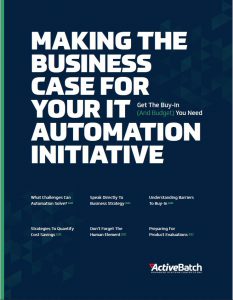Automation architect jobs are popping up in both mid-sized firms and large enterprises like AstraZeneca, HP and ADP. A quick search on Glassdoor, Indeed, or LinkedIn confirms the trend: “Looking for strong automation architects.”
But what exactly is an automation architect supposed to be doing, and how do you know if your company needs one?
What Is An Automation Architect?
An automation architect is a job function with a goal of aligning automation processes, tools, and strategies with business goals. Automation architects work with department heads, stakeholders, and IT teams to enforce best practices, standardize compliance, and optimize automated processes. See what you can achieve with ActiveBatch Workload Automation.
Why Is Automation Important?
IT Process Automation is a critical capability for providing real-time services, reducing manual errors and getting more done with the resources you already have. Automation is used in one form or another across departments and teams, and in many cases an automated process is going to be moving data across the organization.
However, teams are often left to pursue automation independent of a larger, enterprise-wide initiative. This lack of oversight and institutional control can impede cross-silo cooperation and the sharing of data. As various departments implement a wide range of automation solutions, IT teams are stuck managing and supporting a bevy of new and legacy tools, without any standard policies to reference.
For example, Gartner reports that most of its clients have at least eight automation tools which are “frequently deployed and utilized in silos, and may be duplicated.” At the same time, 80% of IT leaders report that silos are a major obstacle to their digital initiatives.
This is what automation architects are expected to amend.
What Does An Automation Architect Do?
Ideally, an automation architect is there from the beginning, putting into place an automation strategy and then procuring the resources necessary to make it happen. In most cases, especially in large enterprises, an automation architect is hired to solve existing problems.
To do this, an automation architect works closely with the CIO (whom they report directly to) as well as the CFO, the CMO, the CTO, etc. The automation architect is a senior-level position that collaborates with senior stakeholders to determine and direct the business’s automation goals.
Once the automation architect has established a set of automation goals, he or she develops an automation initiative to guide the enterprise-wide implementation of new tools and processes.
It is up to the automation architect to determine what can be automated, and when. For instance, it is often easier and more rewarding, financially, to automate file transfers before automating application releases. But, if those files from the claims department are in dozens of different formats and have had an evolving set of standards over the last 20 years…
That isn’t something you can dump on a devops team or solutions architect. Someone needs to be in charge of overseeing the standardization that enables the automated processes which deliver critical services.
For the automation architect, standardization is a crucial part of the job. The automation architect sets enterprise-wide, institutional standards and best practices for software configurations, documentation and testing. The automation architect also gets to work with his or her company’s compliance and legal teams to determine, for example, retention and business continuity policies for automated workflows.
Aside from establishing enterprise-wide policies and best practices, the automation architect is also an internal advocate for automation. Employees and managers can be reluctant to buy into automation (think job-security concerns and skepticism towards new technologies) and so the automation architect often plays a key role in voicing the benefits of automation.
Get The Buy-In And Budget You Need For Your IT Automation Initiative
Read five strategies that will help you build a business case for your IT automation goals.
What Skills Are Necessary?
Communication skills are a must. The automation architect will need to brief business leaders on the opportunities afforded by automation. It is unlikely a CFO is familiar with server tasks and file transfer protocols — the automation architect will need to collaborate across departments, explaining the options available and working with other leaders to develop automated systems that address specific business requirements.
Those communication skills aren’t limited to briefing senior leaders. Automation architects often find themselves motivating business partners to implement automation solutions by explaining the benefits they provide to employees, processes and growth.
As mentioned, part of the automation architect’s job is to establish goals from which he or she can develop an automation roadmap. Part of the reason for creating these goals is to establish quantifiable KPIs to illustrate progress, success and ROI. An automation architect should know how to measure and present quantifiable KPIs (or OKRs) to prove the benefits of enterprise automation.
Finally, an automation architect needs a deep understanding of current automation tools, processes and best practices. There’s a reason automation architects are becoming more popular, why enterprise architects and CIOs are not the ones managing automation architecture: enterprise automation is a dynamic, quickly changing field demanding its own expertise.
Automation architects must have a solid understanding of:
- API-driven integration
- Software development
- Agile methodologies
- Business processes
- Project management
Is An Automation Architect A Good Fit For Your Team?
Whether you work for a Fortune 500 or a mid-sized agency, many of your routine, manual tasks should already be automated. Automated workloads give employees the bandwidth they need to focus on high-priority tasks and long-term goals: automation is what allows companies to innovate beyond competition.
Every company with automation needs an automation architecture, though they might not need an automation architect, per se. An automation architect has a lot of responsibilities that don’t mesh with the job description of enterprise architects, CIOs or site reliability engineers. However, that doesn’t mean someone from the IT department can’t move into the automation architect role. For smaller companies unable to hire a new full-time position, expanding the role of an automation engineer or other personnel with years of experience within the company might make more sense.
There are many benefits to promoting an automation architect from within: that person already knows (or is at least familiar with) the business leaders, the corporate structure, etc. The automation architect needs to understand how the different business segments work together, how data and information flow through the organization and how existing IT infrastructure can be leveraged to support automation.
In many cases, automation architects are being hired to manage automation in specific departments or systems. For example, an automation architect might deal specifically in AWS, Python or Selenium — QA and testing automation architects are increasingly common job titles.
What the automation architect position requires is experience in IT infrastructure, communication skills and a deep understanding of the tools and software that drive enterprise automation. An automation architect needs to know where to find layered automation solutions that are versatile, extensible, and highly compatible with today’s plethora of enterprise software. An automation architect needs to be able to leverage an automation solution designed for change.
Frequently Asked Questions
An automation architect is typically a member of an IT team that is responsible for aligning automation processes, tools, and strategies with business goals. Automation architects work with department heads, stakeholders, and IT teams to enforce best practices, standardize compliance, and optimize automated processes.
Automation architects need a range of skills, including the ability to communicate clearly with a wide range of IT and business users. They’ll also need to be able to define overarching automation goals and create an automation roadmap for the organization. In order to do this, they’ll need a deep understanding of current and developing automation tools, processes and best practices.
A test automation architect is responsible for finding and evaluating the best test automation tools and implementing them in the organization. They are also responsible for designing and implementing a test automation roadmap, strategy and tools.
Automation architects typically have both a bachelor’s degree and a master’s degree in data analytics or similar field. They may also have additional certifications in related IT areas, including scripting languages, test and QA processes and more. Their education typically takes 5-7 years to complete.
Organizations with complex automation requirements should have an automation architect to oversee automation requirements, practices and strategy. As IT and business departments become more reliant on automation, those automation systems will become more complex. Automation architects can help prevent technical debt, reduce operating costs associated with automation and ensure that automation environments are optimized.
See what you can achieve with ActiveBatch Workload Automation.
Yes, automation architects are in demand as organizations look to automation for efficiency, flexibility and speed. Automation architects are being hired at the enterprise level as well as for specific departments or teams within those departments. For example, test and QA automation architect.
See what you can achieve with ActiveBatch Workload Automation.
Ready To See How We Make Workload Automation Easy?
Schedule a demo to watch our experts run jobs that match your use cases in ActiveBatch. Get your questions answered and learn how easy it is to build and maintain your jobs in ActiveBatch.

